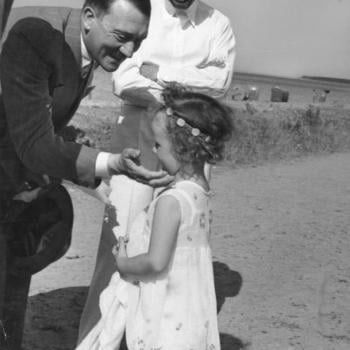Another Reformed Pastor-Theologian Affirms “Subsequence” of Spirit-baptism (R. T. Kendall)
Recently I talked here about unexpected common ground between John Piper, a five point Calvinist, and me—subsequence of “Spirit-baptism” or “infilling of the Holy Spirit” to conversion. A colleague mentioned that I should look at R. T. Kendall, recently retired pastor of London’s famous Westminster Chapel and successor there of Martyn Lloyd-Jones. I had heard of Kendall before—due to his research into John Calvin’s atonement theology. Kendall proved, I believe, that Calvin did not believe in so-called “limited atonement” (which Reformed people prefer to call “definite atonement”).
So I looked up Kendall on the web and saw that he has recently written a book, published this year (2014) entitled Holy Fire: A Balanced Biblical Look at the Holy Spirit’s Work in Our Lives. I ordered it and have now read it. Here’s an excerpt that might whet your appetite to read the book:
There are at least two movements to spring up over recent years that have caused great church splits. One is being too zealous about tongues; the other is being too zealous about Calvinism. People who are so zealous for these sometimes make it a priority and become more excited about tongues or Calvinism than they are about the gospel and leading people to a saving knowledge of Jesus Christ. Both of these movements sometimes do more harm than good. (140)
Holy Fire is clearly a response to John Macarthur’s “Strange Fire” conference of last year. Kendall does not mention the conference specifically but he often juxtaposes the phrases “strange fire” and “holy fire” in a way that makes clear his intention. However, the book is not only a response to “Strange Fire;” it is also Kendall’s personal testimony of his own experiences of the Holy Spirit during his ministry and a non-technical theological exposition of his own conclusions about subjects related to the charismatic movement—Spirit-baptism, supernatural gifts of the Holy Spirit, speaking in tongues, etc.
The book reads like it is written by someone who now feels free to speak his mind without apology and who has nothing to lose. Coincidentally, perhaps, Kendall recently retired from ministry. I’m not suggesting that he has pulled punches in the past, but in this book he comes out swinging against what he considers extremes on both sides of the “charismatic divide.” That does make it especially interesting to read. I would say that nowhere does Kendall step over a line of civility, but in certain cases he is harshly critical of theological views while expressing love for those he considers seriously in error.
For the most part I agree with Kendall’s criticisms. One exception is his attacks (twice in the book) on open theism. He calls it “evangelical process theology” and misrepresents it. After reading his criticisms I had to wonder how much open theism he’s read. It is not at all how he describes it.
Perhaps it would be good to say a few words about Kendall’s credentials. He grew up in the Church of the Nazarene but left that after becoming a Calvinist. He attended Southern Baptist Theological Seminary and then Oxford University where he received the D.Phil. in theology. He pastored Westminister Chapel in London for twenty-five years, having been handpicked to succeed him by Lloyd-Jones. He has written about fifty-five books and has been a popular and frequent speaker at various evangelical conferences.
In Holy Fire Kendall recounts many of his own experiences, and those of people close to him, of the supernatural power of the Holy Spirit: healings, exorcisms, miracles, etc. And he claims that Lloyd-Jones believed in the Baptism of the Holy Spirit/infilling of the Holy Spirit as a subsequent experience after conversion and was not a cessationist with regard to the supernatural gifts of the Holy Spirit.
The autobiographical portion of the book describes Kendall’s long-term tension of being theologically Reformed and charismatic. He chided many of his Reformed friends among conservative evangelicals for being cessationist and many charismatics for seeking the sensational for its own sake and going to extremes.
Even though he is Reformed, in some sense of the word, Kendall is critical of most of the Puritans for resting their assurance of salvation on works. He mentions two exceptions—John Cotton and Thomas Goodwin. Kendall rests his assurance on an inner witness of the Spirit which he considers experiential and not merely cognitive or empirical. Kendall does not mention Pietism, but his ethos is definitely pietistic. He argues for an immediacy of relationship with God rather than a purely mediated one.
Perhaps the harshest criticisms in Holy Fire are aimed at cessationists—whether Reformed or Wesleyan. He argues that cessationism is really motivated by fear of the Holy Spirit’s power rather than driven by sound Scriptural exegesis.
Kendall is extremely critical of “television charismatics”—especially the “prosperity gospel” preachers and healing evangelists who hold the spotlight on themselves rather than on God. Although he never mentions Benny Hinn, I suspect he is talking about him and his ilk. One description of such an evangelist is identical to what I observed at a Hinn healing meeting I attended a few years ago.
Kendall argues for subsequence of Spirit-baptism to conversion, describing the latter as an event and the former as an experience—or series of experiences. He does not believe in a one-time Spirit-baptism but a series of infillings of the Holy Spirit as part of normal Christian experience of sanctification. He believes that every true Christian “has” the Holy Spirit but still needs frequent “infillings” of the Holy Spirit for power over sin and for witness. He also argues for all the gifts of the Holy Spirit continuing in the churches today and says he has spoken in tongues. However, he argues against “tongues for everyone” and making tongues into a sine qua non of Spirit-baptism (the Pentecostal doctrine).
I found Chapter Twelve, “The Ultimate Proof of the Holy Spirit” especially practical. There Kendall names and explains four signs of being filled with the Holy Spirit: fearlessness, power, love, and self-control. He expounds each one very carefully avoiding extremes to which they can be taken.
Holy Fire is a rare combination of devotional literature and theology. I can heartily recommend it to both the tutored in theology and the untutored. It’s an easy read and yet tiptoes into some theologically deep waters.
One thing I agree with very strongly is that the whole debate over whether subsequent-to-conversion infillings of the Holy Spirit should be called “Baptism of the Holy Spirit” is false and a red herring. Who cares what it’s called? A strong case can be made that, according to the New Testament, every true Christian received Spirit-baptism at conversion and a strong case can be made that, according to the New Testament, Spirit-baptism is subsequent to conversion. Apparently the New Testament is not as clear about the language as we’d like it to be. Why do we expect the earliest Christians to have worked out all the details of nomenclature for the experiences they were having? Apparently some baptized people in water “in the name of Jesus.”
The point is not what it’s called but what it is. I agree with Kendall that conversion is not all there is. It’s only the beginning of a holistic Christian experience. And I agree with him that the vast majority of conservative evangelical Christians have fallen into a kind of implicit cessationism whether they’ve ever heard of that term or not. The outcome is what some sociologists of religion call “moralistic, therapeutic deism” or what Dallas Willard called “sin management.” Over my thirty-two years of teaching mostly evangelical students in three Christian universities I have seen numerous, countless young Christians who are distressed because they have been converted to Christ but lack the ability to manage sin in their lives and lack power for service to Christ. In my own mind I often think about them “You need to be filled with the Holy Spirit.” But whenever I have dared to say that or something like that they have recoiled in horror because they have been conditioned to associate that solely with “charismania.” Kendall speaks into that void in American evangelicalism with a sane voice. Interestingly, he argues that in Great Britain, among evangelicals in the Church of England, cessationism, explicit or implicit, hardly exists. The vast majority of British evangelicals are charismatic to some degree. So are the vast majority of Christians in the Global South.
Maybe evangelicals in America need to ask ourselves if we’re missing something. Revival seems to have passed us by. The Holy Spirit is moving as in the Acts of the Apostles elsewhere (only in pockets here). If Kendall is right, the blame lies at the doorstep of implicit, if not explicit, cessationism deeply rooted among American evangelicals. The implicitness lies in our common celebration of “great things God is doing,” including miracles, in the Global South but our rejection of those same works of God here, in our own churches. As soon as some of it begins to happen, often mixed with some extremes of emotional response, we marginalize where it is happening by slapping a name on it and pointing only or primarily at the excesses.
















